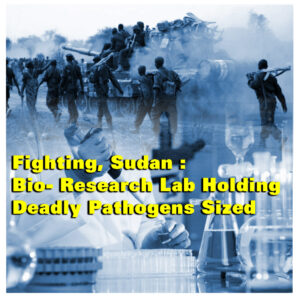
The World Health Organization (WHO) declared a “high risk of biological hazard” in Khartoum, Sudan, after a military group seized one of Sudan’s main bio-labs.
There’s a war in Sudan right now as two rival generals struggle for power. After a week of fighting, one of the factions has seized the National Public Health Laboratory. This laboratory holds research samples of various highly contagious deadly pathogens such as measles, cholera, polio, and other diseases, Reuters reported.
The lab is in central Khartoum, close to flashpoints of the fighting that have pitted Sudan’s military against the Rapid Support Forces, a paramilitary group that grew out of the government-backed Popular Defense Forces called “Janjaweed” by the rebels implicated in atrocities in the Darfur conflict.
During a Tuesday press briefing, a WHO representative in Sudan, Nima Saeed Abid, said that one of the warring armies in Sudan forcefully kicked out the lab technicians at the National Public Health Laboratory in the capitol of Khartoum, creating a risk of biological contamination. Fighters have occupied a national public laboratory in Sudan. The lab held so-called isolates, or samples, of various deadly diseases, including measles, polio, and cholera. Polio and measles, creating an “extremely, extremely dangerous” situation, the World Health Organization warned.
The U.N. health agency also said it had confirmed 14 attacks on healthcare during the fighting, killing eight and injuring two. It warned that “depleting stocks of blood bags risk spoiling due to lack of power.” “Besides chemical hazards, bio-risk hazards are also very high due to lack of functioning generators.”
The lab’s website contains “reference laboratories for controlling some diseases such as polio, measles, tuberculosis, malaria, and AIDS.” The lab is engaged in studying and controlling diseases, including identifying pathogens, testing them, and sending samples to international labs. The work is for preventing and identifying possible epidemics, and the lab works with the WHO.
The Gateway Pundit previously reported U.S. Special Forces had to execute an emergency excavation mission for personnel located at the U.S. Embassy in Khartoum on Sunday due to the ongoing fighting between the Sudan Army and a military group within Sudan called the Rapid Support Forces (RSF).
Over the past few days, tens of thousands of civilians – Sudanese and foreign nationals – have fled to Egypt, Chad, and South Sudan. Laura Lo Castro, the U.N. refugee agency’s representative in Chad, stated that around 20,000 refugees have already arrived in Central Africa, with up to 100,000 expected in the “worst-case scenario.”

